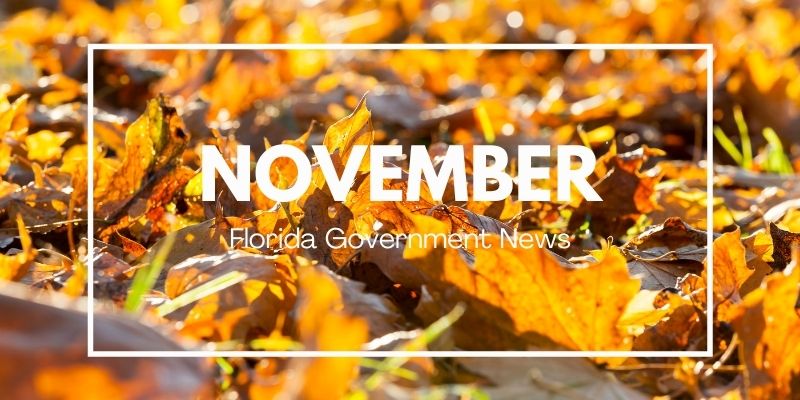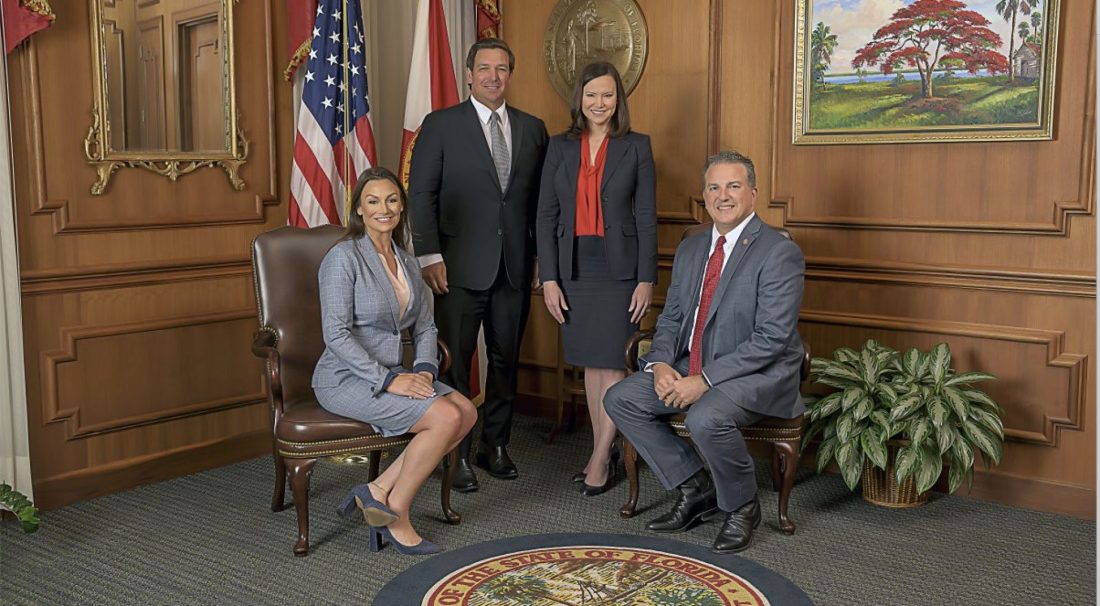
Florida Legislature
The six weeks of pre-session House and Senate committee meetings concluded on Dec. 2.
As of Dec. 9, 556 bills have been filed in the Senate and 2,021 bills have been filed in the House. (Florida Legislature Statistics Report, 12/9/21)
The 60-day 2022 legislative session is scheduled to begin on Jan. 11.
Special Session on Mask and Vaccine Mandates
As we reported in last month’s post, Gov. Ron DeSantis called for a special session of the Legislature to vote on several bills dealing with mask and vaccine mandates. (Sparker’s Soapbox, 11/6/21)
This month, four bills were fast-tracked during a three-day period that both defy the Biden administration’s vaccine-or-test requirements for larger businesses and stop local governments from enacting such standards. (Miami Herald, 11/15/21; Tallahassee Democrat, 11/17/21)
The four bills passed in the special session and signed by the Governor on Nov. 18 are:
- HB 1 – COVID-19 Mandates prohibits Florida businesses from following the OSHA rule that requires companies with 100 or more employees to ensure by Jan. 4 that workers are fully vaccinated or test negative for COVID-19 at least once a week. Fines of $50,000 for larger companies that don’t allow an employee to opt-out would be imposed, $10,000 on smaller firms.
- HB 5 – Florida Occupational Safety and Health State Plan includes early steps to withdraw from federal oversight of occupational safety and health (OSHA) and create a new, Florida-only workplace safety agency.
- HB 3 – Pub. Rec./COVID-19 Vaccination Policies and Practices provides a public records exemption to shield employees who complain about a company’s COVID-19 vaccination policies.
- HB 7 – Vaccinations During Public Health Emergencies repeals a longstanding and never used law that allows state health officers to order vaccinations.
Redistricting Underway

Lawmakers in September began the process of redrawing the state’s congressional and state legislative district lines ahead of the 2022 elections. The Legislature is required by the Florida Constitution to do so at its regular session in the second year following each decennial census. (Sparker’s Soapbox Redistricting Archive)
Florida’s House and Senate have a tacit agreement to allow each chamber to draw its own map. But the congressional map must be agreed upon by both and approved by the governor. (Tampa Bay Times, 11/29/21)
Drawing the Congressional Maps
Nationally, pundits are paying attention to Florida’s congressional redistricting. Democrats hold a slender 220-212 advantage in the U.S. House of Representatives. A congressional map that helps elect one or two more Republicans could help give the GOP control of the chamber. (Orlando Sentinel, 10/6/21)
On Nov. 11, the Florida Senate staff released four proposed maps for Florida’s 28 congressional districts. They all earned “overall” and “partisan fairness” grades of B on the nonpartisan, independent Princeton Gerrymandering Project’s (PGP) Redistricting Report Card. An “overall” B grade means “better than average for the category, but bias still exists.” A “partisan fairness” grade of B means “slight Republican advantage.” Other categories rated are “competitiveness” and “geographic features.” (Redistricting Report Card 12/10/21; Florida Politics, 11/11/21)
The Senate released a second round of its draft congressional maps on Nov. 29. Compared to the first ones, five fewer cities were divided between multiple congressional districts, but for the most part, not much else changed. (Florida Politics, 11/29/21)
Also on Nov. 29, the House released two draft congressional maps. The PGP Report Card gave both maps “overall“ and “partisan fairness” grades of F, signifying “poor for the category, could be much better” and “significant Republican advantage,” respectively. (Redistricting Report Card 12/10/21)
According to data consultant MCI Maps, “Where the State Senate seems eager to avoid lawsuits over their redistricting maps, the Florida House may be ready to roll the dice.” (The MCIMAPS Report, 11/30/21)
For more, see Tampa Bay Times, 11/29/21, Florida Politics, 11/29/21; MCI Maps, 11/30/21.
Drawing the State Legislative Maps
The GOP has held a “Republican trifecta,” holding majorities in both chambers of the state legislature and the governor’s office, since 1999. Currently, Republicans hold 24 (60 percent) of the 40 Florida Senate seats and 78 (65 percent) of the 120 Florida House seats. (Ballotpedia, 12/10/21)
State Senate Maps
On Nov. 11, the Senate released four proposed state Senate maps. As with its proposed congressional maps, they all earned “overall” and “partisan fairness” grades of B on the PGP Redistricting Report Card.
However, the Senate-drawn maps are not without some criticism. Florida Democrats asked for a revision that would end a 30-year-old tradition of linking Black neighborhoods in Tampa and St. Petersburg by crossing Tampa Bay. (Tampa Bay Times, 11/18/21)
State House Maps
On Nov. 29, the House released two proposed state House district maps. The PGP gave one map an A “overall” and for “partisan fairness” and gave one map a C in both categories.
But according to MCI Maps, both have major issues and barely improve on the house’s 2012 gerrymander. (The MCIMAPS Report, 11/30/21)
The Republican chair of the House Congressional Redistricting Subcommittee blasted criticism of the maps “as soon as possible, without even reserving the opportunity for explanation.” But House members from both parties questioned the proposals. Democrats complained about being shut out of the process. Members of both parties asked why the House drafts split up counties like Hillsborough and attempted to connect a Black-majority district in Tampa Bay by linking two communities across the water. (Tampa Bay Times, 12/2/21)
Florida Executive Branch
Florida residents are represented in the Executive Branch of state government by an elected Governor, Attorney General, Chief Financial Officer, and Commissioner of Agriculture.
Meet the Executive Branch

Opposing the Federal Mandates
The bills signed into law by Gov. DeSantis in the special session set up a tug-of-war between the state and federal laws over potentially conflicting rules on requiring workers to be vaccinated against COVID-19. (Miami Herald, 11/13/21)
But Florida is not alone in challenging the federal mandates. States are challenging the CMS vaccine mandate requiring COVID-19 vaccinations for health care workers in district courts in Florida, Missouri, Louisiana, and Texas, and sought preliminary injunctions to block the mandate from going into effect. (American Hospital Association Blog, 12/8/21)
And over 40 lawsuits have been filed challenging the OSHA “vaccinate-or-test” mandate. Those cases have been consolidated for hearing in the U.S. Court of Appeals for the Sixth Circuit, and the federal government has until Dec. 10 to file its reply. No matter how the court rules, expect the loser to ask the Supreme Court to reverse the decision. (American Hospital Association Blog, 12/8/21; JDSupra Blog, 12/10/21)
Unless something unusual happens, both the CMS vaccine mandate and the OSHA vaccine-or-test mandate will remain on hold past the initial December compliance dates facing facilities and employers.
Meanwhile, Florida Surgeon General Dr. Joseph Ladapo on Nov. 18 signed an emergency rule outlining several exemptions an employee can claim to avoid a workplace vaccine mandate. (Miami Herald, 11/22/21)
Opposing Local School Mask Mandates
There has been a long chain of reactions to Gov. DeSantis’s Jul. 30 Executive Order to prevent school districts from requiring students to wear masks during the COVID-19 pandemic. Here’s a review of how we got to where we are now:
In August —
- Florida Department of Health issues rules barring school mask mandates.
- Florida Department of Education begins to fine schools districts that buck the rules.
In September —
- Federal government begins reimbursing districts for the state fines.
- Florida Department of Education tightens a rule about masks in the schools.
In October —
- U.S. Department of Education files a cease-and-desist complaint to block the state’s actions.
In November —
- State Board of Education grants Education Commissioner Richard Corcoran’s request to “vigorously defend” the state from the complaint and explore the option to file suit against the federal government over the issue, if necessary.
- In defending the state board’s actions, Corcoran touted a Nov. 5 decision by a state administrative law judge that upheld the Department of Health’s emergency rule, which said parents can opt students out of school mask requirements.
- Following the Nov. 5 decision, school districts that had continued to require students to wear masks dropped the mandates.
- With all school districts now in compliance with the health department’s rule, attorneys for the state education department said it intends to release money previously withheld from districts for failing to comply with the board’s mask directive.
The federal government’s cease-and-desist complaint is scheduled to be heard on Dec. 10.
For more, see Orlando Weekly, 9/23/21; Orlando Sentinel, 11/11/21; News Service of Florida via Tallahassee Democrat, 11/16/21; and Miami Herald, 11/16/21.
Families of Children with Disabilities Also Suing the State
Separately, families of children with disabilities in August filed suit challenging DeSantis’ ban on mask mandates in schools. They claim it violates the Americans with Disabilities Act and the Rehabilitation Act, both of which protect the rights of people with disabilities. (law.com, 8/31/21)
A federal appeals court is scheduled to hear arguments in that case in February. (Orlando Sentinel, 11/22/21)
UF Free Speech Controversy: An Update

The University of Florida (UF) last month took steps to bar three political science professors from testifying in a lawsuit against the state in a voting rights issue, drawing national attention. While defending its actions, UF said it was “immediately appointing a task force to review the university’s conflict of interest policy.” (Sparker’s Soapbox, 11/6/21)
Professors Say Task Force Was Just a PR Ploy
This month, the three professors who sued UF for barring them from speaking accused University President Kent Fuchs of creating the task force as a public relations ploy and putting people on the committee who had developed the very conflict-of-interest policies being reviewed. (Miami Herald, 11/15/21)
On Nov. 23, the task force released a five-page report containing 10 recommendations for revisions to the university’s policies and procedures, which Fuchs immediately directed be implemented. But counsel to the professors called the recommendations “window-dressing” and said they “will continue to press the University to make the real change that the Constitution requires.” (The Gainesville Sun, 11/23/21)
Faculty Senate Panel Alleges More Violations of Academic Freedom
After weeks of turmoil surrounding the free speech controversy, the UF Faculty Senate called for an independent investigation of whether any undue influence from outside groups is affecting UF’s academic freedom. (Miami Herald, 11/18/21)
An ad hoc committee of faculty at the University charged with evaluating the concerns found that, beyond a handful of recent cases that have made national news, there is a broader problem: “grave concern about retaliation” that is keeping other faculty members silent. (The Gainesville Sun, 12/6/21)
On Dec. 6, it released a 274-page Report of the Faculty Senate Ad Hoc Committee on Academic Freedom. According to its executive summary, “the most significant issues reported to this committee involve:
- barriers to faculty research and publication,
- restrictions related to participating in outside activities that allegedly challenge the political priorities of the executive branch of the State, and
- pressure to alter syllabi and course content to avoid viewpoints unpopular among current elected state leaders.”
The report discusses, among other things, several “challenges” faced by UF researchers who were working on COVID-19 with an unidentified state entity. It describes “external pressure to destroy” data as well as “barriers” to accessing, analyzing, and publishing the numbers. Taken together, those problems “inhibited the ability of faculty to contribute scientific findings during a worldwide pandemic.” (Tampa Bay Times, 12/6/21)
Ad Hoc Committee Received Numerous Troubling Reports
Members of the Faculty Senate Committee also received reports that UF employees were told “not to criticize the Governor of Florida or UF policies related to COVID-19 in media interactions.” (Report of the Faculty Senate)
They were also informed of a grievance filed by a professor in the College of Education, claiming he was threatened with discipline if he used the words “critical race” in his curriculum and program design. The grievance also claims that at a late September meeting of faculty and administrators in the College of Education, faculty were warned to steer clear of curricula that touch on race or anti-racism. (Report of the Faculty Senate; Tampa Bay Times, 11/30/21)
“More problematic than the individual examples of pressure to stifle unpopular viewpoints or restrict research was the palpable reticence and even fear on the part of faculty to speak up on these issues,” the report states. “There was grave concern about retaliation and a sense that anyone who objected to the state of affairs might lose his or her job or be punished in some way.” (Report of the Faculty Senate; Tampa Bay Times, 11/30/21)
Other Executive Branch News
- DeSantis’ office doesn’t have to testify in lawsuit over controversial election law, judge says. News Service of Florida via Miami Herald, 11/8/21
- DeSantis files for reelection, allowing campaign spending during special session. Herald/Times Tallahassee Bureau via Bradenton Herald, 11/8/21
- ‘Grave concerns’: Florida Surgeon General Joseph Ladapo’s medical license OK’d in two days. USA Today Network-Florida via Tallahassee Democrat, 11/10/21
- Ron DeSantis, Florida Department of Corrections announce new bonuses to recruit correctional officers. Florida Daily, 11/18/21
- DeSantis aims to re-establish Florida State Guard. The Capitolist, 12/2/21
- Attorney General Ashley Moody announces statewide retail crime task force. The Ledger, 12/2/21
- Nikki Fried faces ethics case over financial disclosures for medical marijuana lobbying work. News Service of Florida via Naples Daily News, 12/8/21
News from Washington
All Florida voters elect the state’s two U.S. Senators.
Florida’s U.S. Senators are Marco Rubio and Rick Scott.
Key Votes in the U.S. Senate
Senate clears last major hurdle to raising debt ceiling, NYTimes, 12/9/21
S.610 — Protecting Medicare and American Farmers from Sequester Cuts Act
Rubio — Nay; Scott — Nay
Passed — 64-36 on 12/9/21
U.S. Senate passes Republican bill to overturn Biden vaccine mandate, Reuters.com, 12/9/21
S.J.Res.29 — A joint resolution providing for congressional disapproval … of the rule submitted by the Department of Labor relating to COVID-19 Vaccination and Testing…
Rubio — Yea; Scott — Yea
Passed — 52-48 on 12/8/21
U.S. Senate passes bill to avert government shutdown, sends to Biden for signature, Reuters.com, 12/3/21
H.R. 6119 — Further Extending Government Funding Act
Rubio — Yea; Scott — Nay
Passed — 69-28 on 12/2/21
That’s it for Florida government news for November!
